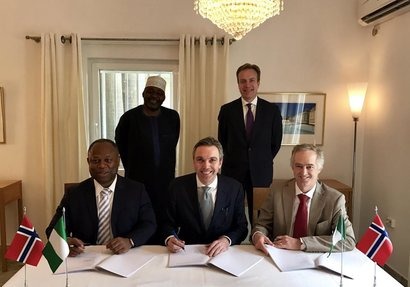
Africa50 is an African Infrastructure Fund sponsored by the African Development Bank and more than 20 African States and Norfund (the Norwegian Investment Fund for Development Countries). The Nova Scotia Power plant project is located in Dutse in the Northern Nigerian state of Jigawa. It could help to attract $2 billion of investments into Jigawa while also implementing Nigerian President Muhammadu Buhari's plans to provide jobs and economic opportunities, especially for the nation's youth.
The signing ceremony of the JDA was held in the presence of Børge Brende, the visiting Norwegian Foreign Minister, His Excellency, Barrister Ibrahim Hassan Hadejia, Deputy Governor of Jigawa State, as well as officials from the Nigerian Bulk Electricity Trading among others.
“New local power generation capacity is a key element to attract sizeable investment into the State and region, especially into new industries such as light manufacturing and agricultural processing” said His Excellency the Deputy Governor.
Executive Vice President Terje Pilskog, who signed the JDA on behalf of Scatec Solar, added that the formation of the consortium symbolises Norwegian and Nigerian commitment to invest in clean energy in Nigeria. With the Government of Norway taking a direct investment role through Norfund, significant regional and Nigerian ownership through Africa50, and the track-record of Scatec Solar, this offers one of the most solid partnerships for solar PV projects globally.
According to Alain Ebobisse, Africa50's CEO, access to reliable energy is one of the most critical needs in Africa, including in Nigeria, where it is a government priority.
Apart from the three equity investors, the American Overseas Private Investment Corporation (OPIC), Islamic Development Bank and the African Development Bank are expected to be senior debt providers for the project. International Finance institutions say the key to successful investment is the Nigerian state's issue of project documents that provides necessary investor confidence and the formulation of a clear roadmap to sustainability in the energy sector.
With an estimated investment of $150 million, a production of 200,000 MWh of electricity per year and 120,000 tons of CO2 emissions avoided annually, the Nova Scotia solar plant will help Nigeria rapidly increase its generation capacity, provide economic opportunities, fight desertification caused by climate change, and contribute to fulfilling Nigerian President Muhammadu Buhari's commitments to develop renewable energy as part of the Paris Climate Change Agreement.
In July, the Nova Scotia project signed a 20-year PPA with Nigerian Bulk Electricity Trading (NBET). Located on 200 hectares of land, the project has strong fundamentals with high solar resources and direct access to the transmission grid through a simple connection route. The consortium will continue to work with CDIL, a Canadian renewable energy development company focused on Africa, and BPS, a Nigerian strategic consulting, to move the project from "pipeline" and achieve financial close in 2017 and commercial operations in 2018.
Nigeria is Africa's largest and the world's 26th biggest economy. With Nigeria's per capita electricity consumption at 155 kwh, one of the lowest in the world, there is a huge need to increase power production in order to expand and diversify the Nigerian economy.
For additional information:

